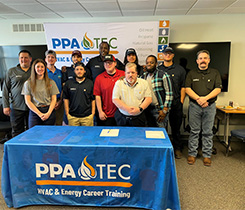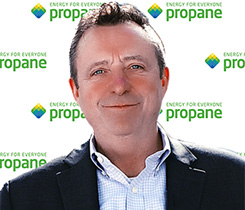Newsbriefs
DOT to renew 5% special permit through 2012, Barrett says
Just a month after the U.S. Department of Transportation announced it was renewing the special “5 percent permit” through 2010, DOT announced it was extending the permit through 2012. The announcement came from Deputy DOT Secretary Tom Barrett during a speech to Propane Days attendees in Washington, D.C. June 10-11.
Permit 13341 allows transportation of consumer storage tanks containing propane in an amount greater than 5 percent of the tank’s water capacity (up to 500 gallons).
The current permit is available on the NPGA website at www.npga.org.
Worthington issues another price hike
Worthington Cylinders announced June 9 another 10 percent price increase on all steel heating and system tanks ranging in size from 200 to 420 pounds.
“Our raw material costs continue to escalate,” said Dusty McClintock, vice president of sales and marketing for Worthington Cylinders. “We are aggressively working to minimize the impact of raw material cost increases through continuous improvement initiatives at our production facilities. However, due to the magnitude of these increases, we must adjust pricing accordingly.”
Prices will increase with all orders shipped on or after July 15, 2008. This increase is in addition to the 11 percent that was previously announced this year on all heating and system tanks.
DOT, NTTC want hazmat truck equipment mandate
The Department of Transportation (DOT) will likely propose requiring certain types of new trucks to be equipped with electronic stability control systems, even as National Tank Truck Carriers (NTTC) announced its intention to petition the agency to mandate the equipment for new trucks hauling hazardous materials.
According to a report in the June 2 Transport Topics newspaper, National highway Traffic Safety Administration officials say it is likely there will be a rule-making in 2009 that will look to mandate electronic stability controls on new vehicles.
Officials at the Federal Motor Carrier Safety Administration confirmed that the agency was discussing electronic roll stability requirements with PHMSA and NHTSA for possible publication in early 2009.
Electronic stability has been identified in a joint industry-government study as a way to significantly reduce rollover crashes, which account for 52 percent of truck-occupant fatalities and three out of four hazmat spills.
NTTC’s Executive Committee voted May 18 to petition DOT to mandate the technology on trucks hauling placarded hazmat loads. The association supported a mandate only on new equipment, and not as a requirement to retrofit existing trucks.
Pipeline rate litigation decision delayed again to Sept. 30
A decision on the three-year-old lawsuit by the National Propane Gas Association and a coalition of shippers on the MAPL pipeline has been extended to Sept. 30, 2008.
The litigation before the Federal Energy Regulatory Commission opposes two rate increase proposals filed for the pipeline that would raise rates by almost 100 percent and significantly drive up the cost of shipping propane to the important northern Midwest marketplace.
Chief Administrative Law Judge Curtis Wagner on June 4 extended the time for an initial decision. His order states in part “The Chief Judge will extend the time for the issuance of the initial decision in this proceeding in view of the fact that the hearing lasted about two months and the record consists of testimony from 13 witnesses, on 3,245 pages of transcript and 564 exhibits. In addition, the proceeding involves 37 issues, several of which are novel, while others are extremely complex.”
Many expiring cylinder RINs need renewal this year
Many of the companies that re-qualify propane cylinders by visual inspection are scheduled to renew their Requalifier Identification Number (RIN) that was first issued by the Department of Transportation (DOT) back in 2003.
DOT rules require all facilities that re-qualify cylinders to obtain a RIN through its Office of Hazardous Material Safety. These identification numbers are typically valid for five years, after which they need to be renewed in the same manner as the original application.
The National Propane Gas Association originally developed a one-page, RIN application that DOT endorsed and placed on the agency’s website. A copy of an updated version of the RIN application is available on NPGA’s website at www.npga.org. Click on Issues and scroll down to HM-220D Cylinder Construction/RIN Program.
NPGA has also updated and placed on its website the document titled Commonly Asked Questions that pertains to RINs.
Renewal applicants should complete the application and send it to DOT. Applicants may fax it to (202) 366-3753 or (202) 366-3308 or e-mail it to approvals@dot.gov.
They can also send it by regular mail to: Associate Administrator for Hazardous Materials Safety, Attention: Approvals, PHH-32, Pipeline and Hazardous Materials Safety Administration, U.S. Department of Transportation, East Building, 1200 New Jersey Avenue, SE, Washington, D.C. 20590-0001.
Calif. Public Utilities Commission to release citations proposal
On June 12, the Utilities Safety and Reliability Branch of the California Public Utilities Commission held a workshop regarding its proposed resolution to receive authority to cite and fine propane operators that are non-compliant with the PUC’s propane safety program. The proposed resolution will grant authority to PUC inspectors to issue citations for the following violations:
- Failure to file an annual report, repair a safety hazard, or comply with PUC directives. ($750 fine per violation, plus $100 per week to the maximum penalty specified by law or until the violation is corrected)
- Willful obstruction of PUC inspectors to gain access to a propane distribution system. ($750 fine per violation, plus $100 per week to the maximum penalty specified by law or until the violation is corrected.)
- Falsifying documents. ($750 fine)
- Failure to pay the propane surcharge. (A fine of up to 25 percent of the amount due)
The complete proposed resolution is available at the PUC’s website at: docs.cpuc.ca.gov/published/comment_resolution/80667.htm.
PUC officials said they expect to release the final proposal for comments in July and take it to the commission at its August meeting for approval. For more information, contact WPGA’s Lesley Garland at (916) 447-9742 or exec@westernpga.org.
CleanFUEL USA engine earns certification from EPA, CARB
CleanFUEL USA has announced U.S. EPA and California Air Resources Board (CARB) certification of the industry’s first and only propane-engine system that is an OEM replacement technology for both new and aftermarket gasoline powered engines.
CleanFUEL’s liquid propane fuel injection (LPI) system is designed to convert medium-duty fleets – such as school buses, shuttle buses and 4500-8500 series GM trucks – to operate on propane.
“We developed LPI technology to deliver improved fuel economy and competitive engine performance compared to gasoline and diesel powered vehicles, while significantly reducing greenhouse gas (GHG) emissions,” said Curtis Donaldson, CleanFUEL USA president and CEO.
“With EPA/CARB approval of the LPI engine system, fleet managers nationwide can realize the transportation fuel benefits of propane using a technology that produces the lowest emissions for medium-duty vehicles on record.”
LPI is a propane conversion system for 8.1-liter gasoline engines, offering fleet owners an affordable fuel option over diesel or gasoline. The integrated engine system provides the transportation industry the first CARB- and EPA-certified liquid propane fuel system with the potential to counterbalance steadily increasing petroleum fuel prices.
“Vehicles using propane can play a significant role in boosting California’s transportation fuel diversity, adding fuel competition and reducing our dependence on gasoline and diesel,” commented James D. Boyd, vice chair of the California Energy Commission.
“CleanFUEL USA is an innovative company, and I commend them for taking the lead without government support to independently advance the engine technology that offers an alternative fuel choice and reduces criteria and GHG emissions.”
NPGA issues safety alert for anhydrous ammonia exposure to propane cylinders
Propane marketers are urged to be aware that propane cylinders with brass valves used in the production of methamphetamines could be damaged and dangerous.
The safety alert – available at www.npga.org – warns marketers to be on the lookout for brass valves that might have a blue-green stain, which indicates it was exposed to anhydrous ammonia, one of the chemicals used in the production of methamphetamines.
The deterioration of the brass will lead to cracking of the valve body or its components and can ultimately lead to a violent, unexpected expulsion of the valve from the cylinder, resulting in injury or death.
The safety warning suggests that if you suspect a cylinder is affected by anhydrous ammonia exposure, immediately contact your fire department, or the nearest office of the United States Department of Justice’s Drug Enforcement Administration (DEA) for information on properly disposing of the cylinder.
If these respondents are not sure what to do, for assistance call PERS at (800) 728-2482.
















